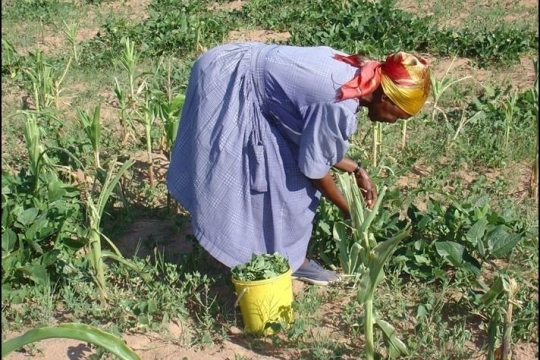When weather-related shocks harm a rural farming family’s agricultural yields, thus reducing the household’s food supply, people turn to nature or their community as a way of coping. That’s why initiatives designed to help such families cope with climate change should consider strengthening social and natural ‘capital’ for the rural poor in sub-Saharan Africa.
‘When people run out of food, they turn to the veld to get bushmeat and edible wild fruits, vegetables and insects - what we call natural resource capital,’ explains Dr Byela Tibesigwa, from the University of Cape Town’s Environmental Policy Research Unit (EPRU), ‘or they turn to their neighbours, friends or relatives for help.’
Because of this historic and informal coping mechanism, Tibesigwa and her colleagues at the EPRU suggest that boosting this kind of informal capital might prove to be a cheaper and easier way to help households cope during lean times, compared with technical and capital intensive strategies such as insurance.
 Byela Tibesigwa
Byela Tibesigwa
This emerges after the EPRU conducted a household-level study, to track the link between social capital, natural resource capital and agriculture-related shocks. The focus was on households in Bushbuckridge in rural Mpumalanga, a province in north-east South Africa. However the findings are relevant to similar communities in southern Africa where families in the former homelands depend on small scale, rain-fed agriculture, as well as the natural environment, for their food supply and livelihoods.
Tibesigwa notes that many rural South Africans living in the former Bantutstans are particularly vulnerable to the impact of climate change: as a legacy of these apartheid-era settlement schemes, many households live in remote, densely populated areas that are low in resources and have few job opportunities; they are dependent on rain-fed agriculture and have few ways to adapt their farming practices; and there are high levels of poverty. ‘This means that weather-related shocks are likely to translate into even greater food insecurity for these communities,’ warns Tibesigwa.
Several existing studies have suggested that having access to neighbours, friends or relatives, as well as to the wild veld, are important ways for people to cope when extreme weather events reduce their farming yields and their household food, Tibesigwa explains. ‘If we want to help poor rural families adapt to changing climatic conditions, we need to help build their access to natural and neighbourhood ‘capital’.’ The researchers note that the size of the environmental shock also matters, as households who lose all or most of their harvest following an extreme weather event will consume significantly less food. However Tibesigwa warns that there are concerns about the sustainability of this reliance on informal capital.
‘If people depend heavily on the natural veld, this will lead to a depletion of natural resources. We need to find win-win policy interventions that link sustainability with adaptation strategies geared towards natural capital use.’ In terms of the relationships within communities that allow greater resilience, researchers saw that those households that gave to others were left more vulnerable, while those who received assistance from neighbours or family or friends were better off. ‘We’re concerned that for vulnerable households, there are trade-offs in terms of giving and receiving assistance. This will impact on their welfare. So when we think about how to support this reliance on social capital, we must keep this in mind,’ says Tibesigwa. The culture of strong ties and interpersonal relationships in many rural communities, means that if policy design is meant to be sustainable, it will have to target existing relationships. Tibesigwa conducted the research along with the EPRU’s A/Prof Martine Visser and Dr Wayne Twine.
by Leonie Joubert
